4 Major Drug Shortages That Could Affect You in 2024
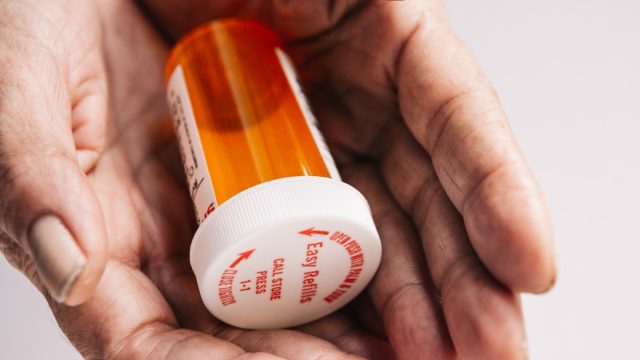
In today’s world, we expect what we need to be available when we need it. That mindset certainly applies to the different medications we’re prescribed, which can be debilitating to go without. But now, the U.S. is facing an onslaught of drug shortages, with over 300 drugs in short supply as of late spring—the highest number in a decade. Making matters worse, the average shortage impacts a least half a million people, according to an Office of the Assistant Secretary for Planning and Evaluation (ASPE) report to Congress. And we could see several drug shortages continue in 2024.
Drug shortages “are an ongoing concern in the U.S.,” per the ASPE report, impacting consumers via “higher out-of-pocket costs, higher insurance premiums, and adverse health outcomes.” Beyond this, in an opinion piece for The New York Times, Emily Tucker, PhD, assistant professor of industrial engineering at Clemson University, pointed out that the average shortages aren’t usually “short,” lasting approximately 1.5 years, and substitute medications aren’t always the best option for patients.
According to the U.S. Food and Drug Administration (FDA), shortages occur for a range of reasons, including “manufacturing and quality problems, delays, and discontinuation,” with the agency then working with manufacturers to “prevent or reduce the impact” of the shortfalls. However, Tucker points out that there are underlying issues with the “fragile” generic drug supply system, which will require legislative action by Congress to correct. In the meantime, patients are left dealing with ongoing shortages, including four that could extend into next year. Read on to find out which medications may continue to be in short supply.
RELATED: Highly Effective New Weight Loss Drug Hits U.S. Pharmacies Amid Ozempic Shortage.
1
ADHD medications
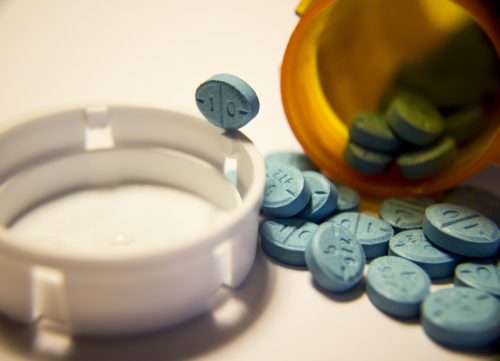
Shortages of different medications to treat attention deficit hyperactivity disorder (ADHD) have been ongoing, with the FDA formally announcing the shortage of Adderall, a common amphetamine-based medication, on Oct. 12, 2022. In July of this year, the FDA confirmed that ADHD drugs methylphenidate (Concerta) and lisdexamfetamine (Vyvanse) were in shortage as well.
According to Everyday Health, there are a few different reasons for the ADHD medication shortage (sometimes just referred to as the “Adderall shortage”). The first is that the U.S. Drug Enforcement Administration (DEA) set manufacturing quotas for these drugs, which are controlled substances that have the potential for addiction and overdose. Last year, DEA analyses showed that there were 1 billion doses that manufacturers could have produced but “did not make or ship.”
The increased demand for ADHD medications in recent years—as diagnosis and treatment of the condition has increased in adult men, women, and adolescent girls—likely played a role in the shortage, as did the easing of prescribing regulations during the COVID-19 pandemic, Everyday Health reported.
Some shortages of Adderall formulations have been resolved, and FDA spokesperson James McKinney told Everyday Health that the situation overall may be improving.
“Manufacturers are working to meet the demand and the FDA is helping with anything we can do to increase supply. Supply is increasing, and the FDA is continuing to offer assistance,” he said.
According to the FDA, some of these medications could also become available this month and early next year. However, others warn that ADHD patients could still be dealing with a shortage in 2024—and potentially even longer.
“You’re probably looking at 2025 before this levels out,” David Burke, executive director for the Ohio Pharmacist Association, told Cleveland.com late last month.
2
Chemotherapy medications
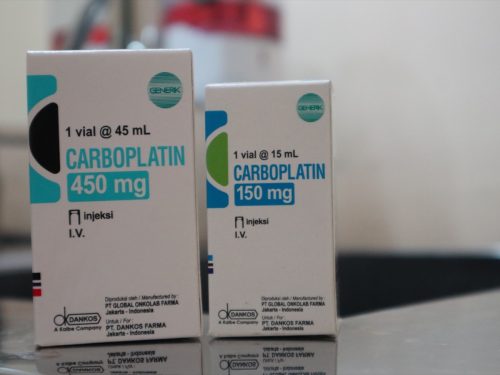
Major generic chemotherapy drugs are also in shortage, which is particularly scary for patients currently battling cancer.
According to a Sept. 12 press release from The White House, the U.S. was experiencing a shortage of 15 cancer drugs “due to manufacturing and supply chain issues,” with the “widely used generic drugs,” cisplatin, carboplatin, and methotrexate all in short supply.
According to a recent survey conducted by the American Society of Health-System Pharmacists (ASHP), over 99 percent of respondents reported they were experiencing drug shortages, and almost 60 percent reported that the chemotherapy drug shortages were “critically impactful.”
In her NYT opinion piece, Tucker noted that carboplatin and cisplatin were affected by panic buying, which occurs when large hospitals try to avoid shortage risks and place large orders. There were also quality issues: A 2022 FDA inspection revealed poor practices at one of Intas Pharmaceuticals’ manufacturing plans, prompting them to stop production, Fierce Pharma reported.
While Intas resumed production, and some cancer centers report an improvement in shortages, the FDA still lists the drugs as being in short supply, the NYT reported today.
RELATED: Mucinex Is Being Pulled From Pharmacy Shelves, Outraged Shoppers Claim.
3
Weight loss drugs
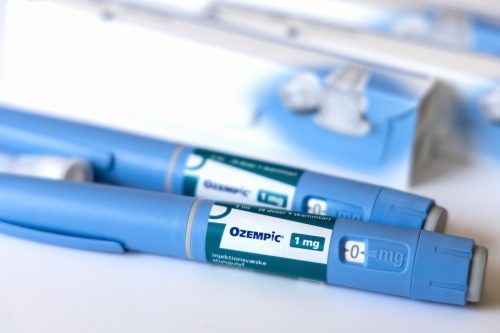
The U.S. is also battling a shortage of weight loss and diabetes drugs. The treatments have skyrocketed in popularity thanks to their staggering weight loss results. But lately, patients have had difficulty filling their prescriptions for Novo Nordisk’s weight loss and type 2 diabetes drugs, Wegovy and Ozempic (semaglutide), respectively, as well as Eli Lilly’s diabetes treatment Mounjaro (tirzepatide), CNBC reported.
Late last month, Novo Nordisk confirmed that it would be rationing starter dosage kits in Europe, Reuters reported. In addition, the company said it would reduce supplies of Victoza, another diabetes drug, in order to put more resources into manufacturing Ozempic.
As Medscape reported, the shortage of semaglutide—the active ingredient in Ozempic and Wegovy—is unlikely to last forever, and CNBC reported that supply could improve thanks to Novo Nordisk’s investment strategy. Mounjaro supply has also improved in the U.S., Eli Lilly said in November, but it remains in limited supply on the global scale, per CNBC.
However, demand isn’t expected to slow down next year—and even though analysts are anticipating an improvement in supply constraints, CNBC noted that they think it will be years before there’s a full resolution.
Guggenheim analyst Seamus Fernandez told the outlet that the supply problems are probably “the biggest thing” for investors in 2024.
RELATED: Highly Effective New Weight Loss Drug Will Cost 20% Less Than Ozempic.
4
Amoxicillin
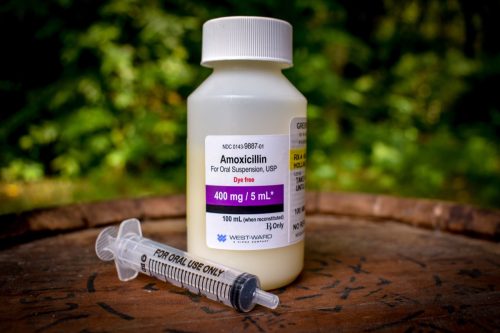
Rounding out the list of drug shortages likely to extend into 2024 is the powdered form of amoxicillin, a commonly prescribed antibiotic. The specific form in shortage is used to make liquid medications that are generally prescribed to children who can’t swallow pills, CNN reported.
Amoxicillin has been in shortage since Oct. 2022, per the FDA, and the ongoing issue is compounded by an increase in strep throat cases dating back to late summer this year.
CNN reported that not all amoxicillin powder manufacturers have given reasons for the shortage, but on the FDA website, different forms from Hikma Pharmaceuticals are listed as being “on allocation.” Per CNN, this means that customers can order limited amounts of the antibiotic.
“For amoxicillin powder for oral suspension which went into shortage due to increased demand last fall, the four manufacturers continue to produce, release, and work to fully recover from the shortage. We will continue to keep the website updated with planned recovery dates as the companies provide them and offer assistance on anything the companies need to increase supply,” the FDA said in a statement to CNN last month.
With 2024 just around the corner, it’s unlikely that this shortage will clear up entirely before we ring in the new year.
“We’re still seeing a lot of, particularly amoxicillin and some of the medications that we’re using quite a lot right now in cold and flu season,” Sara Sahl, MD, a Hartford Healthcare pediatrician based in Torrington, Connecticut, told the Hartford Courant in late November. “We use them to treat ear infections and strep throat infections, and basically, it’s just the pharmacies are out. We get a lot of messages that say it’s been backordered or that formulation is not in stock.”
RELATED: For more up-to-date information, sign up for our daily newsletter.
- Source: ASPE Report to Congress: Impact of Drug Shortages on Consumer Costs
- Source: Homeland Security & Governmental Affairs Majority Staff Report: Short Supply, The Health and National Security Risks of Drug Shortages
- Source: FDA: Drug Shortages
- Source: FDA Announces Shortage of Adderall
- Source: Joint DEA and FDA letter
- Source: CDC, Trends in Stimulant Prescription Fills Among Commercially Insured Children and Adults
- Source: Shortage: Amphetamine Aspartate Monohydrate, Amphetamine Sulfate, Dextroamphetamine Saccharate, Dextroamphetamine Sulfate Tablet
- Source: Strengthening the supply chain for cancer drugs
- Source: ASHP, Severity and Impact of Current Drug Shortages
- Source: Semaglutide Injection Shortage
- Source: Tirzepatide Injection Shortage
- Source: Amoxicillin Powder, For Suspension Shortage